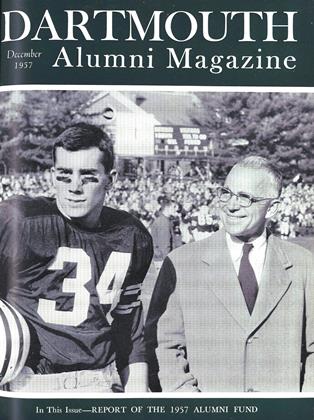THIS seems to be the time to start considering what to give for Christmas,
There are before me several handsome volumes which would be welcome in almost any family.
The first is the American Heritage book of Great Historic Places, published by Simon and Schuster. The book divides the United States into New England, the Atlantic Gateway, the Appalachian Frontier, the Old South, the Great River (the Mississippi of course), Lakes and Prairie, the Great Plains, the Spanish Southwest, and the Farthest Frontier (the Far West). There are many illustrations in color, many more in black and white. On the whole they are well chosen though, for the most part, familiar. The text is adequate and obviously is directed to old and young. At the end of each section there is a kind of guide book to the most important spots in that section. For instance, I turn to Kansas. On page 295 there is a list of towns and cities worth seeing in the great plains state. For Fort Riley it says: "Founded in 1853 as Camp Center to protect the Santa Fe Trail, the fort was later headquarters for General Custer's famous Seventh Cavalry. On the fort grounds is a simple limestone building intended as a warehouse but used briefly in 1855 by the first territorial legislature of Kansas, and now maintained as a state museum."
What more do you need to know about Fort Riley?
Another lavish book is 300 Years ofAmerican Painting by Alexander Eliot, who works for Mr. Luce. The book boasts 250 fine illustrations in color. The text and illustrations cover the early Colonial painters (Copley, West, Trumbull, and Stuart); the Hudson River School; "artists on horseback" such as Bingham, Remington, Catlin, Miller, Leigh; sophisticates abroad like Whistler, Sargent and Mary Cassat; the great Americans: Innes, Homer, Eakins and Ryder; and end with the Ashcan School, including Luks, Henri, Shinn, Glackens, Davies, and the incomparable Sloan. Realists like Wyeth, Bellows, and Hopper are considered, as well as the "moderns," Baziotes, Rothko, Gottlieb, Gorky, and Pollock. Naturally, many others.
For the bird lovers, and, thank Heaven, they are legion, I can heartily recommend Roger Tory Peterson's The Bird Watcher'sAnthology recently published by Harcourt. There are 85 selections taking up 401 pages. Space limitation prevented Mr. Peterson from including all his favorites but here are worthy passages from Burroughs, Kieran, Peattie, Teale, Beebe, Hudson, Audubon, Darwin, Sutton, Thoreau, Peter Scott, Apsley Cherry-Garrard, and many others. Mr. Peterson illustrated his own book. This would make a fine Christmas present for any lover of the outdoors.
I found in the Dartmouth Bookstore a most lovely volume, Scotland, by G. S. Fraser and Edwin Smith. This was printed in London by Thames and Hudson. It sells for $10 and would gladden the heart of all and sundry who know and love this northern country. There are 195 photogravure plates, four in stunning color. There are a few more than fifty pages of text: the rest is visual.
For the scholarly reader I can recommend Erich Heller's The DisinheritedMind: Essays in modern German literature and thought. Goethe, Burckhardt, Nietzsche, Rilke, Spengler, Kafka, and Kraus are the ones treated. The central theme is that the modern mind may find "ultimate reality" and ultimate spiritual validity wholly within a world which the Christian tradition of Europe believed to depend for its justification on transcendental values. Roger Strauss published this and is to be congratulated.
The Earl of Halifax in Fulness of Days (Collins, 1957) has written an unpretentious and modest autobiography, of interest to all who wish to review some of the great events of the past twenty years. There are many interesting comments on Roosevelt, Churchill, Chamberlain, etc.
Dave Bradley has done just about the impossible in writing a thoughtful, ungushing biography of a young man, John McLane Clark '32, who died long before his time. Mr. Bradley has been wise to let John speak for himself; there are long passages from his newspaper columns, his letters, and so on. The title is Journey ofa Johnny-Come-Lately.
In writing such a memorial book it is not possible to please everybody, so Mr. Bradley has wisely followed his own good sense and judgment, and the result is a serious and honest book about a man I, at one time, knew very well. This is the John Clark I remember.
 View Full Issue
View Full Issue
More From This Issue
-
 Feature
FeatureA Dartmouth History Lesson for Freshmen
December 1957 By FRANCIS LANE CHILDS '06 -
 Feature
FeatureStymied in the Bowl
December 1957 -
 Feature
FeatureClass Achievemts, 1957 Fund
December 1957 -
 Feature
FeatureChairman's Report
December 1957 By William G. Morton '28 -
 Feature
FeatureDevelopment Program Leaders Named
December 1957 -
 Class Notes
Class Notes1952
December 1957 By RAYMOND J. BUCK JR., EDWARD J. FINERTY JR.
HERBERT F. WEST '22
-
 Article
ArticleHanover Browsing
February 1937 By HERBERT F. WEST '22 -
 Article
ArticleHanover Browsing
November 1937 By HERBERT F. WEST '22 -
 Article
ArticleHanover Browsing
March 1941 By HERBERT F. WEST '22 -
 Books
BooksNO PLACE TO HIDE
January 1949 By Herbert F. West '22 -
 Books
BooksCONTRARY COUNTRY
December 1950 By HERBERT F. WEST '22 -
 Article
ArticleHanover Browsing
April 1955 By HERBERT F. WEST '22








